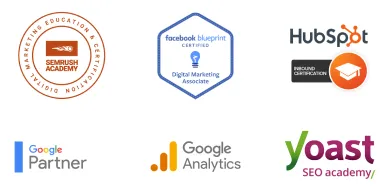TO LEARN IS TO GROW
Learning Center
We do our research and publish our results. Should probably call this the Growing Center.


How a Small Business Can Grow Big with Local SEO
We explain how local SEO can help small businesses grow and the tips and tricks to improve your local search ranking.
Why Local SEO Is Important for Small Businesses?
The internet has leveled the playing field for small businesses, particularly those serving niche markets and local communities. In fact, a recent study showed that about 46% of Google searches involved local information, while 72% of consumers who did a local search visited a brick-and-mortar store within 5 miles.
What Is Local Search Engine Optimization?
Local SEO is a marketing technique to increase the search visibility of companies serving local communities or certain geographic areas. Oftentimes, they are small businesses with a physical location such as restaurants, cafes, gyms, auto repair shops, and hair salons.
Local service providers such as plumbers, professional cleaners, and HVAC technicians can also benefit from local SEO.
Simply put, these businesses can make themselves visible to their local target customers who are using search engine tools like Google to learn more about their “pain points” and the companies that could provide them solutions.
One of the goals of local SEO is to improve the local search rankings of a business. Hence, the content of your websites and other online platforms should include local keywords and phrases, for example, “restaurants in Sacramento.”
Including the location and landmarks can also help with your local search rankings since Google and other search engines can detect and utilize the location of your target customers through their mobile devices.
How Google Determines Local Ranking?
The search engine giant uses three factors to determine local rankings: relevance, distance, and prominence. In addition, their algorithm is constantly evolving to make sure that it provides search results that are helpful and relevant to consumers.
Relevance
Relevance is about how well a local business profile matches the users’ search queries. To ensure that you are “relevant” to your target audience, all your online platforms should include complete and detailed business information, i.e., address, contact number, and email.
Also, make sure that you create a location-specific “About Us” page.
Distance
Even if people don’t specify their location in their search queries, Google’s algorithm calculates the distance between them and the nearby businesses. For this reason, you might rank higher than your competitors if you are closer to the users.
Prominence
Prominence refers to the popularity of a business, not just online but also in the offline world. For instance, community parks, the town’s favorite hang-out spots, museums, and local landmarks are popular in local search results.
Meanwhile, Google determines the prominence of your business based on articles, directories, and links. Also, the more reviews and positive ratings you have, the higher is your local ranking.
Your prominence is also determined by your search engine ranking.
What If Your Business Doesn't Show Up for Relevant Local Searches?
You might be losing hundreds of thousands every year if you don’t show up for relevant local searches. According to a survey released by SEO Tribunal, around 78% of location-based mobile searches resulted in a purchase.
Another study conducted by Joel House Search Media showed that 28% of consumers who did local searches bought a product or signed up for a service.
How to Fix the Problem:
If you don’t show up for relevant local searches, you can fix it by doing the following tips recommended by Google:
Add or claim your business through Google My Business.
Add these critical details: physical address, phone number, category, and attributes.
Verify your business locations so your business can show up in Google Maps and Google Search.
Add your business hours. Be very specific about your operating hours, which should include schedules for holidays and other special events.
Respond to reviews. When you respond to reviews, including the not-so-stellar ones, you show that you value your customers' feedback. Responding to them also improves your search rankings.
Add high-quality photos. When businesses use good images, they can turn themselves into recognizable brands. Also, consumers trust and conduct business with companies with a professional "facade."
Online Listings and Directories

Aside from Google My Business, you can further beef up your local search ranking by adding or claiming your business through listing and directories. Below is the list of most popular (and free) business listings.
Yelp
HubSpot
Facebook
Apple Maps
Bing
Thumbtack
LinkedIn Company Directory
Super Pages
MapQuest
Better Business Bureau
Just like in Google My Business listing, make sure that you provide these online directories with complete and consistent information that includes your name, location, and contact details.
Localized Website Content
One of the many ways to localize your website content is to include your name, location, and phone number on your site–ideally on every web page and not just on the “About Us” or “Contact Us” page.
In general, it is ideal to include your contact number on every web page, a practice that has been shown to increase conversions and revenues. By making sure that your business is contactable, you can also improve customer satisfaction and loyalty.
Frequently posting blogs that include location-specific content, landmarks, and local events and festivals can also help your local SEO.
Social Media and Local Content
While social media platforms do not directly influence your search engine ranking, they are a great way to connect with your target audience and increase brand awareness and exposure.
If you’re a small business that provides service to your community, use a local hashtag to gain exposure and increase views. Remember, social media users often post their location and conduct search queries using places and landmarks.
A Word of Caution About How a Small Business Can Grow Big with Local SEO
When you create localized content, whether it is for your website or social media account, don’t use keyword stuffing or post irrelevant content that doesn’t provide value to your target customers. These bad practices not only destroy your brand (and reputation) but also result in penalties from Google and business directories.
To learn more about local SEO and how you can turn your small business into a strong brand, contact LOJO Marketing at (916) 303-4080. You can also schedule a FREE consultation with us.
At LOJO Marketing, our team of digital marketing experts and content creators can help small- and medium-sized companies remain competitive in this new business landscape.
Built for Growth. Backed by 25 Years of Trust.
For over two decades, LOJO has been a trusted partner to hundreds of businesses just like yours. Whether working directly with owners, managers, teams, or boards of directors, our goal remains the same: to be a reliable and results-driven asset to your business.
Over the years, we’ve carefully built a team of experts—each selected for their unique skills, strengths, and personalities. Our clients choose LOJO because they know we genuinely care about their success.
And after 25 years of helping businesses grow, we’re more committed than ever.



Built for Growth. Backed by 25 Years of Trust.
For over two decades, LOJO has been a trusted partner to hundreds of businesses just like yours. Whether working directly with owners, managers, teams, or boards of directors, our goal remains the same: to be a reliable and results-driven asset to your business.
Over the years, we’ve carefully built a team of experts—each selected for their unique skills, strengths, and personalities. Our clients choose LOJO because they know we genuinely care about their success.
And after 25 years of helping businesses grow, we’re more committed than ever.




Matthew Rogers, President
iProspect Check
After spending several months reviewing multiple proposals from several different companies we engaged LOJO to develop a new website that represents our company effectively. We worked initially with Stephen Platte who helped create the scope of the project. Stephen was knowledgeable and always followed up with me on time and as promised.
He "closed the deal" for LOJO with his professionalism, service orientation and easy going approach. Once we signed the contract we were introduced to Jay Kelly who would be the creative lead for LOJO. This was the most challenging part of the project for my company, as there was no shortage of ideas from our side. Jay managed the project flawlessly, and once we had all agreed to the design, Jay introduced us to Eric.
Eric Lay is one of the founders of LOJO. Eric took the design we had developed and brought it to life. We delivered content as quickly as he requested it. Eric kept the project on task and we responded by exceeding every deadline for content. In turn, once provided, literally not a day went by that Eric didn't add the content and take the next step. In just a few weeks we launched our new website. Eric is a pleasure to work with.
His positive attitude and consultative approach really enhanced the experience and made a big difference for us in the outcome of our project. We would welcome you to visit our website to take a look at the quality work of LOJO. We are very pleased with LOJO and look forward to working with them in the future as we pursue an aggressive SEO strategy."
After spending several months reviewing multiple proposals from several different companies we engaged LOJO to develop a new website that represents our company effectively. We worked initially with Stephen Platte who helped create the scope of the project. Stephen was knowledgeable and always followed up with me on time and as promised.
He "closed the deal" for LOJO with his professionalism, service orientation and easy going approach. Once we signed the contract we were introduced to Jay Kelly who would be the creative lead for LOJO. This was the most challenging part of the project for my company, as there was no shortage of ideas from our side. Jay managed the project flawlessly, and once we had all agreed to the design, Jay introduced us to Eric.
Eric Lay is one of the founders of LOJO. Eric took the design we had developed and brought it to life. We delivered content as quickly as he requested it. Eric kept the project on task and we responded by exceeding every deadline for content. In turn, once provided, literally not a day went by that Eric didn't add the content and take the next step. In just a few weeks we launched our new website. Eric is a pleasure to work with.
His positive attitude and consultative approach really enhanced the experience and made a big difference for us in the outcome of our project. We would welcome you to visit our website to take a look at the quality work of LOJO. We are very pleased with LOJO and look forward to working with them in the future as we pursue an aggressive SEO strategy."

Matthew Rogers, President
iProspect Check
The team at LOJO were wonderful to work with. They are well organized and very patient as we worked through our marketing strategy and developed a well thought out and clear action plan at a reasonable price. We will definitely be back for our future campaign needs."

Jon Crosby, Founder
Dazil

